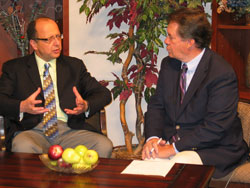 |
Pierre Fayad, M.D., left, does an interview with Jerry Dishong of KDUH-TV in Scottsbluff. |
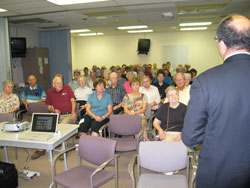 |
Dr. Fayad addresses a full house at the 55 Plus meeting in McCook. |
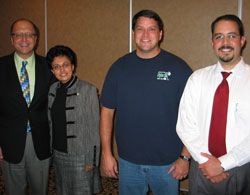 |
Dr. Fayad met with North Platte’s two neurologists — Sona Shah, M.D. (second from left) and Jose Cardenas, M.D. (right). They were joined by Jim Smith, M.D., a former UNMC faculty member and emergency medicine physician who is the incoming chief of the medical staff for Great Plains Regional Medical Center. |
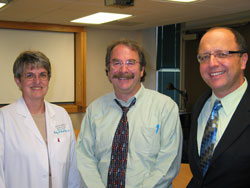 |
Dr. Fayad met with two of Scottsbluffs’ neurologists — Betty Ball, M.D., and Joe Lopresti, M.D. |
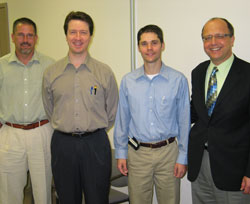 |
Several UNMC alums met with Dr. Fayad in McCook, from left, Chuck Krysl, physician assistant, John West, M.D., and Wade Fornander, M.D. |
Dr. Fayad, the Reynolds Centennial Professor and chairman of the UNMC Department of Neurological Sciences, took his message on the road last week heading to western Nebraska to make presentations in Scottsbluff, North Platte and McCook.
In two days, Dr. Fayad made five presentations — to a variety of audiences including health professionals and senior citizens — and also did 10 interviews with western Nebraska news media.
“I think stroke is often times overlooked and neglected, because heart disease and cancer attract so much of the attention,” he said. “I want to make sure that people know about stroke, recognize it and respond to it as an emergency. It is important to realize the many advances that have been made recently in the treatment and prevention of stroke.”
Dr. Fayad feels it’s important to convey his message not only in Omaha but around the state. At least once a year, he tries to clear his calendar and make a visit to rural Nebraska or southwest Iowa.
“It’s critical to get out from behind the desk and go out and meet the people on the front line,” he said. “We work with these hospitals throughout the year, and many times, UNMC provides medical school and residency training to the physicians we meet with in rural communities.
“We want to share the latest information with these rural Nebraska hospitals — to make sure that the patients there receive the best possible care. At the same time, it’s good to establish relationships with these hospitals, as they frequently look to the medical center when difficult cases arise.”
In Scottsbluff, Dr. Fayad addressed more than 60 health professionals from Regional West Medical Center, including neurologists Joseph Lopresti, M.D. and Betty Ball, M.D.
Dr. Lopresti used the opportunity to learn more about highly specialized treatments to remove blood clots causing stroke. Dr. Ball said she learned two things from Dr. Fayad’s presentation — that statins help reduce the risk of stroke by 20 percent for people who have had a stroke and that a combination of aspirin and another anti-platelet agent is 20 percent more effective than aspirin alone in preventing a stroke recurrence.
In North Platte, Dr. Fayad spoke to nearly 100 people at the North Platte Senior Center as well as a group of 13 health professionals from Great Plains Regional Medical Center, including two neurologists — Sona Shah, M.D. and Jose Cardenas, M.D.
|
|
In McCook, Dr. Fayad spoke to a group of health professionals from Community Hospital and to more than 50 members of the hospital’s 55 Plus program.
In looking back on the two-day excursion, Dr. Fayad praised the work of John Navis in UNMC’s Center for Continuing Education for his relentless efforts at arranging the speaking engagements with rural Nebraska hospitals.
“This is a great service that John provides,” he said. “I would highly recommend that other UNMC health professsionals utilize his talents and connections to serve UNMC’s outreach mission.”